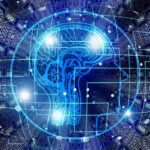Artificial Intelligence (AI) is the use of digital intelligent networks to perform tasks which require human intelligence. It is the use of data networks, systems and machine learning to perform cognitive and problem-solving functions. The application of AI in medicine is not unheard of. It has been used in medical robotics, diagnostics, image-guided surgery, gene sequencing and analysis. But the COVID-19 pandemic has boosted innovation exploring the use of AI in flattening the curve.
Perhaps the most basic role AI plays is in the spread of information pertaining to the pandemic. COVID-19 advisory chat bots are used to provide basic information on the Coronavirus and ways to curb its spread. This helps serves to reduce misinformation and the undue panic that comes with it. It reduces the traffic on healthcare phone lines such that people with more urgent enquiries can get the help they need. Also, apps and virtual assistants have been fitted to track symptoms and provide useful information examples include Apple health check app, Siri give me guidance, and the Alexa daily check which provides virtual Covid-19 screening based on questionnaires.
- Jangebe abduction will be the last – Buhari
How I survived 3 impeachment attempts as dep gov — Abaribe
AI has also helped in forecasting trends of cases to concentrate attention where it is needed. In the United States, it has helped in identifying and flagging high-risk patients and patients with symptoms of lung deterioration as is peculiar in COVID-19 cases. This allows timely attention and potentially reduces the likelihood of fatality. AI based analysis of data from wearable devices like smart watches show potential for use in COVID-19 testing. Researchers found that from detecting changes in heartbeat, smart watches could tell that two-thirds of volunteers were infected about a week before they reported symptoms. Furthermore, AI has helped in the management of COVID -19 cases and screening of potential patients. It has helped in the monitoring of patients who self-quarantine rather than hospital services through virtual consultations and robotics; virtual follow-up consultations, robotic telemedicine carts with cameras and interactive screens, e-ICUs and virtual patient visits. These are being used to reduce exposure and danger to medical staff in the US and some Asian countries.
Asian countries have also embraced AI-based diagnostic equipment. The automated temperature screening equipment, iThermo by IHiS is used in Singapore to conduct temperature checks at a distance. Similarly, image analysis by the Intelligent Evaluation System used in China evaluates the severity of the disease and some side effects like pneumonia. These provide valuable data in the treatments, as well as minimise risk of exposure. Furthermore, development is ongoing for an app that would offer preliminary diagnosis by evaluating the likelihood of infection by sound analysis from cough samples. Patients’ coughs are computed, and the app would compare any input by running a similarity search to cloud data. It could confirm virus status within two minutes. The results could be one of three outcomes: COVID-19 likely, COVID-19 not likely or test inconclusive. This saves time, cost, and isolation measures could be taken to reduce the chances of spreading the virus.
A major issue of concern with the pandemic is contact tracing. People who may have been exposed to a confirmed case are likely to be infected. Since the coronavirus could present as a common cold, people may be unaware that they have it. AI has helped in software tracking to find people who have been exposed to the virus. In South Korea, an app, Private Kit: Safe Paths is used to track people who have the virus and users who have had contacts with confirmed cases. It lets users track their movement to check if they came in contact with someone who had the virus, and also notify users if an infected person is nearby. By this, users are informed of places which may be unsafe due to infected people being there. Also, China has used AI surveillance drones in public spaces to ensure that people follow the safety guidelines, and loudspeakers call out warnings to defaulters.
While AI present numerous benefits, there are numerous challenges that come with them. AI backed surveillance and contact tracing methods often piggyback off mobile phone location data. This raises concerns about individual (digital) privacies. Also, with AI and digitalisation comes the issue of cybersecurity. Efforts must be made to make these systems impenetrable by hackers and ill-meaning people. Also, a general distrust for artificial intelligence may hinder the use of AI in medicine. It is also noteworthy that most of the innovation in AI diagnostics and treatment of COVID-19 are in highly industrialised/advanced countries mostly in Asia, Europe and North America. This is understandable because they have invested massively in technology and artificial intelligence over the years, but it also highlights the slowness of other countries in investing in technology and this negligence can be attributed to the slow response rate to tackling the pandemic.
AI in the thick of the coronavirus pandemic has pushed the world to lean more on digital technology. Some countries, however, struggle to keep up. Countries like Nigeria lag behind technologically on many fronts even though we have the best of techies in the world.
AI is data driven and data centred and though Nigerians have their data captured across many platforms such as IPPIS (Civil servants), Bank Verification Number (BVN), Voter’s card, Immigration, Road Safety, National Identification Number (NIN) etc. there is no uniformity or harmonization of these captured data, therefore deployment of AI is really difficult and slow.
This poor attitude in handling citizen data coupled with frequent change in policy, policy overlap, data analysis and record keeping makes it very unlikely that Nigeria joins the AI wave soon. This is further compounded with a rocky business environment and a tendency to stifle innovation in technology.
During the first wave of the pandemic, contact tracing was a big challenge and still is and a more concerted investment in AI, research and development would make Nigeria better for it. AI can also be deployed in other areas of security, agriculture, education etc.
It seems Nigeria is left behind and continues to wait on the unknown before making a total switch digitally. How much longer can we wait? The world surely would not wait for us and the time to invest in AI is now.
Mfonobong Chelly is an intern at HipCity Innovation Centre, Abuja.

 Join Daily Trust WhatsApp Community For Quick Access To News and Happenings Around You.
Join Daily Trust WhatsApp Community For Quick Access To News and Happenings Around You.


